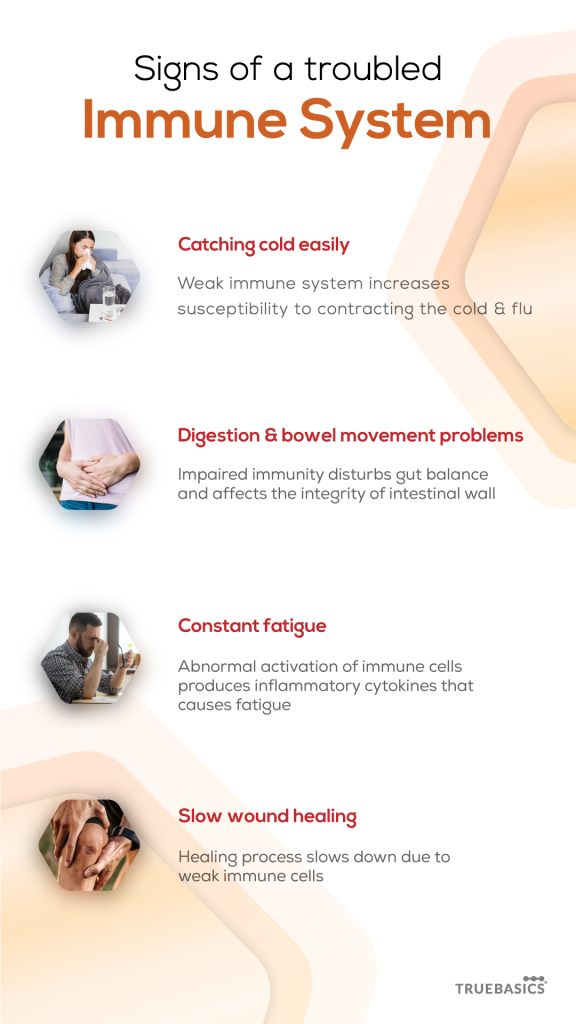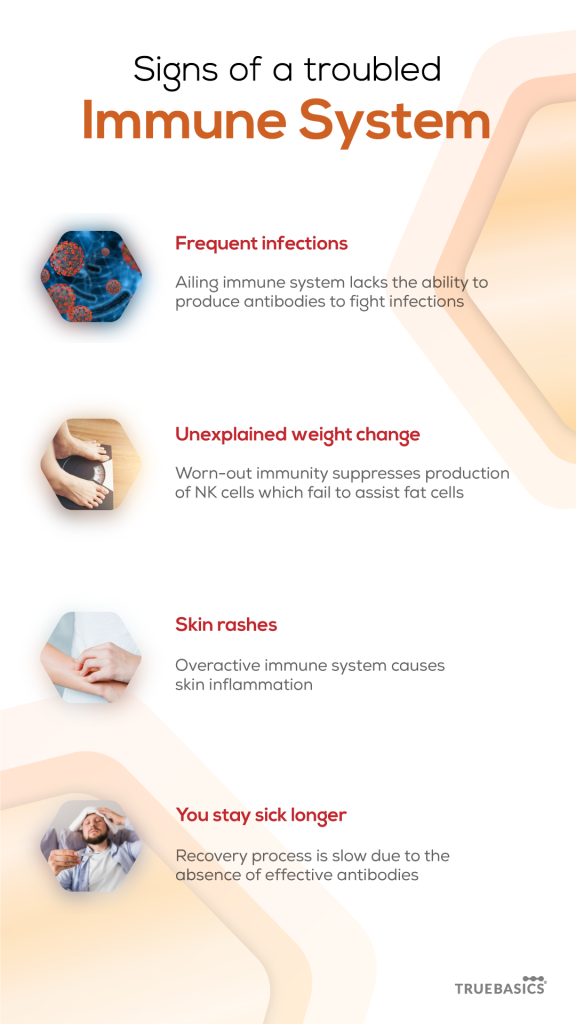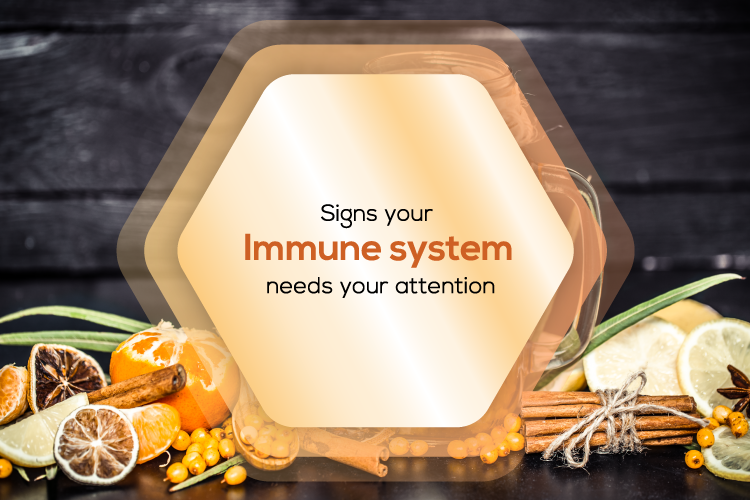The human body is susceptible to various external attacks of viruses, bacteria, and fungi – that find a human body more suitable as their home. The immune system is the body’s defense mechanism against infections. It is a network of cells, tissues, and organs that work together to defend the body from harmful germs. When bacteria, viruses, and other germs invade your body, they multiply and attack. This invasion, called an infection, makes you sick and it is the immune system’s job to fight the germs and protect you from these invaders and diseases. [1]
Importance of a Healthy Immune System
The immune system retaliates to the attacks on the body by developing antibodies and immune responses to mitigate the adverse effects of the alien cells. Your immune system is as important as breathing and beating of your heart as it helps improve and maintain overall health. Your immune system is a well-organized defence system that impedes the entrance of pathogens into the human body, and if such invasion does occur, it takes care of it rigorously and intelligently [2]. Some of the key features of a good immune system are as follows:
- The immune system identifies and destroys the intrusive elements that can cause illness or infection to the human body. [3]
- It helps the body get rid of the harmful viruses and their effects, as well as prevent the augmentation of abnormal cells. [4]
- Some severe medical conditions have their roots in the growth of some abnormal cells, which is checked by our immune system at early stages and brought into the light for proper treatment if the system can’t fight it off by itself.
- The immune system also seeks to flush out the toxic elements out of the body on a consistent basis to help maintain overall health
- It helps the body to recover from the after-effects of any infection or illness.
The cells that make up your immune system need energy too, and when you’re low on juice, they’ll be on low-battery mode. This is when our natural immune defenses are weakened, and even normally innocuous bugs can begin to cause strife.
Our immune system requires a lot of energy to defend our body. Feeling tired and achy, overheating, and glands swelling are signs that our immune system is busy fighting something. [5]
Signs Your Immune System Needs Attention
Your immunity system is active 24×7, flushing out pathogens in case of an infection, terminating them and then returning the body to the normal with a constant lookout for new infections. Multiple factors can disrupt this cycle of protection either leading to sub-optimal immunity where the immunity is not able to fight infections or overactive immunity where the system remains in war mode even after the fight is over. Factors like ageing, nutrition, stress, inadequate sleep, lifestyle choices, and medical conditions can alter the functioning of the immune system. Not everyone is born with the same immunity levels, some people are born with weak immunity and are inherently more prone to various diseases. Autoimmune diseases are cases of extreme “mistaken identity” where the immune system fails to differentiate between foreign and healthy cells. In such cases, the immune system mistakes healthy cells as foreign cells and releases antibodies that attack healthy cells. Therefore, you need to be on a constant lookout for signs from the immune system that is constantly looking out for your health. Check out the major symptoms below that are the cornerstones of a malfunctioning immune system.
Sign #1: You catch a cold easily
One of the most common symptoms of a weak immune system is susceptibility to infections. People with weak immune systems are prone to frequent cold infection due to seasonal variations or contact with a person having a cold or another infection. Colds are highly contagious. Viruses and other infectious illnesses can spread from person to person through close contact. They can also spread in the water droplets that a person expels into the air when they cough or sneeze. Generally, it can take the immune system three to four days to develop antibodies and fight off the pesky germs, and your body would be up and running within a week, but it is different for people with a weakened immune system. [6]
There are a number of things you can do to fend off the cold, especially when you believe you have a weak immune system. [7]
- Avoid eating processed food. Eating foods high in antioxidants, such as vegetables and fruits, will boost your overall health and help protect you from flu and other viruses and infections all year.
- Exercise regularly and get enough sleep. People who exercise in moderation report fewer colds.
- Practice basic hygiene and wash your hands from time to time.
Sign #2: Upset tummy – digestion and bowel movement problems
Your gut is an important part of the immune system. Almost 70% of your immune system resides in the gut. It is the part where the external environment meets the internal body system via the food that you consume. Anything and everything we eat has a lot of bacteria and viruses in it. Our gastrointestinal (GI) tract is home to an enormous and complex community of commensal bacteria (good bacteria). These commensal gut bacteria help in digestion and detoxification by releasing enzymes and antibacterial substances respectively. The immune system plays a vital role in keeping the GI healthy by eliminating pathogens that fight against the good bacteria and disturb its balance in the gut [8]. If you frequently have diarrhea, ulcers, gas, bloating, cramping, or constipation, it could be a sign that your immune system isn’t working is well is it could. [9]
Furthermore, your cells create a tightly packed intestinal barrier that prevents toxins and pathogens from moving from the gut to the body. Impaired immunity and overgrowth of harmful bacteria affect the integrity of the intestinal wall which may affect the digestion process. This can cause indigestion and bowel movement problems [10]. Intake of inflammatory foods can also cause the break down of the intestinal walls which pushes the immune system into fighting even the undigested protein. This can lead to pushing the immune system into overdrive and generation of inflammatory response all over the body.
It is imperative to eliminate offensive foods from your diet and be careful about food sensitivities. Apart from this, you should practice basic hygiene, look for side effects of certain medications, and avoid antibiotics whenever possible. [11]
Sign #3: Constant fatigue
Do you often feel tired even after getting enough hours of sleep? While there could be multiple reasons behind fatigue, this could be because of your weak immune system as well. When your body is fighting an infection, it wears down your body leading to a feeling of lethargy (remember the weakness you feel when you have a fever?). usually, the immune system resets after the infection is over and the body returns to normal. However, a malfunctioning immune system or certain infections can throw a wrench in this process and your immune system is unable to reset to normal even after the infection has passed and continues to generate immune response [12]. Altered immunity results in abnormal activation of the T lymphocytes and other immune cells. Overactive T-lymphocytes produce pro-inflammatory cytokines which may cause degeneration of muscle fiber leading to muscle weakness and constant fatigue. Hence, it is important to maintain a healthy body to promote restful sleep, energy production, and a good mood for a well-functioning immune system. [13]
Sign #4: Your wounds heal slowly
When you get a cut or a burn, your body immediately gets into a damage control mode by sending more nutrient-rich blood to the area of the injury. Wound healing is accomplished in 4 phases – homeostasis (focused on stopping the bleeding), inflammation (removal of microbes, debris, and preparation for regeneration), proliferation (Healing the wound and skin regeneration), and remodeling (growth of new tissues) [14]. The immunity system gears into action after homeostasis. Immune cells enter the damaged site, initiate the microbial killing and debris removal followed by wound healing, reconstruction of tissues, new blood vessel formation, and skin regeneration [15]. A weak immune system can delay or slow down immune responses leading to delayed healing, slow tissue reconstruction and difficulty in regenerating new skin. This makes the healing process slow and causes the wound to linger for longer periods.
People suffering from diabetes generally have a weak immune system as high blood sugar levels impair white blood cell functioning. This increases their chances of getting an infection. Diabetic patients may also develop poor circulation that can slow the movement of blood to the affected damage site making the wounds heal slowly. [16]

Sign #5: Frequent infections
Under the circumstances where the individual is susceptible to infections, there is a repetitive cycle that makes it difficult to overcome the susceptibility towards infection. This happens when the immune cells of that individual’s body are not strong enough to fight that infection. A weak immune system lacks the ability to produce antibodies that fight germs and infections. Due to which, the infection either persists or recurs after some time.
Enhancing the immune system can provide the answer to stop recurring infections. To achieve this, one should consume a balanced diet rich in vitamins and minerals, sleep well and exercise regularly. [17]
Sign #6: Unexplained weight change
It is possible for a weak immune system to cause an unexpected increment in weight even though there haven’t been any significant changes in dietary consumption. The natural killer (NK) cells of the immune system are responsible for a series of events that regulate weight. NK cells assist the fat cells in making fibroblast growth factor-21 (FGF-21), which is a protein that triggers metabolism and converts white fat into the healthier brown fat [18]. If you have a weak immune system, then your body may not make enough FGF-21 due to the lack of adequate NK cells in the body. This can prevent the body from converting white fat to brown fat resulting in weight gain.
Sign #7: Skin Rashes
Skin is the body’s largest organ and your first line of defence when it comes to fending off germs and infections. Any ongoing issue with your immune system can show up on your skin as well. Inflammation is the immune response to invading pathogens. Dry, itchy skin and skin rashes are often a result of the inflammatory response by the immune system. The red swelling around that you might have come across around a wounded skin is due to inflammation that allows for dilating of blood vessels that initiate the recovery process. However, an immune system working in hyperdrive can trigger an inflammatory response even though there is no infection to fight or the infection is over. This triggers a chronic inflammation which manifests itself in the form of skin rashes.
However, skin rashes can also be caused due to other factors such as hot and humid weather, excess sun exposure, or scratchy clothes that don’t fit. But if you come across unexplained skin rashes even after taking adequate protection from external factors, it might be time to take a look at your immune system functioning.
Sign #8: You stay sick longer
A weak immune system increases the body’s susceptibility to infections and renders itself incompetent in fending them off. With an ailing defense mechanism, the body is unable to initiate adequate immune responses required to kill the infection quickly and recover in time. A weak immune system is not able to produce adequate antibodies required to fight the harmful pathogens. The inadequate production of effective antibodies often leads to prolonged illness. If you are taking longer than usual to recover, it is advisable to consult a doctor, complete the prescribed medication course and incorporate a healthy diet in your routine. Support your immune system with immunity boosting measures so that it can regain its strength to fight for you.

In Conclusion…
Your immune
system is up and running all the time to keep you away from infections as well
as take adequate measures against pathogens. However, multiple factors can lead
to a weakened immune system. The weakened immunity can manifest itself in
several ways. If you notice that you’re repeatedly falling sick, your wounds
are healing slow, feel tired most of the time or have developed skin rashes,
then they might be a sign from your immune system to take immediate actions. Take
note of these warning signs and take necessary measures to keep yourself
healthy and boost the immune function of your body.
Sources:
[1] https://www.health.harvard.edu/staying-healthy/how-to-boost-your-immune-system
[2] https://www.medicalnewstoday.com/articles/320101
[3] https://www.webmd.com/a-to-z-guides/autoimmune-diseases.
[4]https://www.immunology.org/public-information/bitesized-immunology/pathogens-and-disease/immune-responses-viruses.
[5] https://www.sciencealert.com/chronic-fatigue-syndrome-might-be-caused-by-an-overactive-immune-system
[6] How to boost your immune system – Harvard Health.” 22 Sep. 2014, https://www.health.harvard.edu/staying-healthy/how-to-boost-your-immune-system.
[7] https://symptoms.webmd.com/cold-flu-map/keep-immune-system-healthy
[8] https://www.ncbi.nlm.nih.gov/pmc/articles/PMC5433529/
[9] https://www.webmd.com/digestive-disorders/sibo-overview-what-is-it.
[10] https://www.ncbi.nlm.nih.gov/pmc/articles/PMC2515351/
[11] https://www.aboutibs.org/constipated-diarrhea.html
[12] https://www.moleculeralabs.com/chronic-fatigue-immune-dysfunction-syndrome/
[13] https://www.mayoclinic.org/diseases-conditions/chronic-fatigue-syndrome/symptoms-causes/syc-20360490.
[14] “Immune Regulation of Skin Wound Healing”, https://www.ncbi.nlm.nih.gov/pubmed/29984112.
[15] http://sitn.hms.harvard.edu/flash/2013/issue133a/
[16] Diabetes and wound healing.” 24 Apr. 2019, https://www.medicalnewstoday.com/articles/320739
[17] Approach to the adult with recurrent infections” 12 Nov. 2019, https://www.uptodate.com/contents/approach-to-the-adult-with-recurrent-infections.
[18] iNKT Cells Induce FGF21 for Thermogenesis and Are Required for Maximal Weight Loss in GLP1 Therapy, Lynch, Lydia et al., Cell Metabolism, Volume 24, Issue 3, 510 – 519













